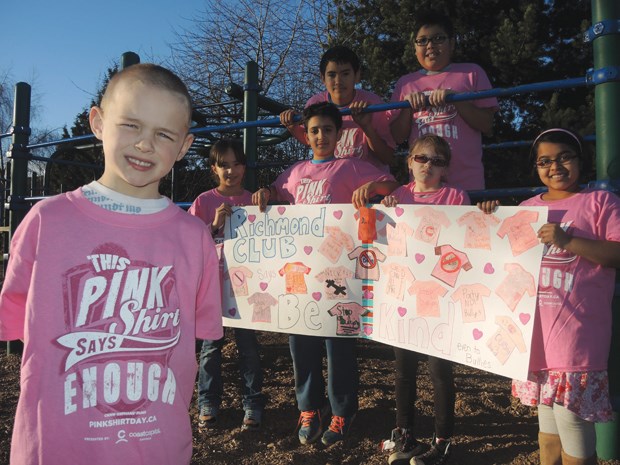After eight years of Pink Shirt Day events in Richmond and across the rest of the country, there is a palpable momentum to the anti-bullying campaign to the point where the message is now crossing generational boundaries.
That’s according to Carolyn Tuckwell, president and CEO of the Boys and Girls Club of South Coast B.C., who believes the essence and related actions behind Pink Shirt Day, which is celebrated today (Feb. 24), are spreading effectively into adult workplace environments, showing that the message is maturing along with those youngsters who helped spread it in the movement’s early days.
Voicing the anti-bullying mantra is not just child’s play anymore, she said.
“One of the most obvious differences you see today with the anti-bullying message is a complete intolerance to bullying now, whereas in the first year of the campaign some people were dismissive — it was looked on as something everyone went through and had to deal with,” she said. “Now, it’s advanced to where there are workplace policies and legislation against bullying. All this has happened in a relatively short period of time. And the intolerance is a reflection of how seriously people have taken the matter.”
Leading the way has been the voice of children, which has also carried other “greater good” messages over the decades, such as campaigns in the 1970s to curb littering and smoking.
“What we’ve seen that we’re really excited about is the way children’s’ voices can lead the way. And each year has had a slightly different variation on the anti-bullying theme,” Tuckwell said. “This year, it’s the concept of kindness and that one size fits all, highlighting the simplicity of putting an end to bullying.”
Any one person can end bullying by simply changing their own behaviour, she added.
“Instead of thinking that bullying is a rite of passage, we can think of it as something we can all counter with kindness,” she said.
In Richmond, Pink Shirt Day efforts at the Boys and Girls Club, which is run out of Mitchell elementary school, will include providing pink T-shirts for the 100 or so youngsters who attend.
“And, at the end of the (school) day, all of our kids from all 12 of our clubs in the Lower Mainland will gather at our Fraserview Club in Vancouver for a ‘wrap concert’ with local artists dancing, performing and talking about all the events of the day,” Tuckwell said.
The gathering will also feature youngsters who took part in the club’s champion against bullying contest where they submitted art or written work that reflected their commitment to putting an end to bullying.
“It gives them something to participate in that is larger than their own little neighbourhood, which has become important to them,” Tuckwell said.
“One thing that is important to remember about the Boys and Girls Club is we’re all about welcoming kids after the school day, which is curriculum-based,” she said. “And one of the reasons why kids want to come to the club is that they learn by doing. We move the kids from curriculum to actually practising what they’ve learned.”
That means activities such as arts and crafts, role playing and leadership across age groups.
“That can help them understand what it looks like to step in if someone is bullying, and how to give feedback if someone is bullying,” Tuckwell said. “Throughout the year, we are providing about 60,000 hours of anti-bullying content. And that happens both in the activities at the club, as well as in gender-specific programs and trips out into the community.”
Weaved into all of those areas are anti-bullying themes, such as kindness and building healthy relationships. And that includes adults.
“When we first talk about bullying, our minds first go to kids,” Tuckwell said. “But when you talk to people — adults — they are quick to state their own personal experiences, whether it’s in the workplace or relationships. And that’s why it resonates so much.”
Today, she added, the awareness of bullying is much more at the forefront in society. It’s now OK to put a name to the behaviour, no matter what setting or age group.



